#self-seers ii death and man
Explore tagged Tumblr posts
Text



x
#interview with the vampire#iwtv#louis de pointe du lac#armand#the vampire armand#loumand#iwtv art#egon schiele#self-seers ii death and man#THE SELF PORTRAIT AS THE PORTRAIT OF A SE#LF A CRISIS#LOUMAND BEDROOM I LOVE YOUUUU#working on the other paintings mara made this so hard skfhskhf
436 notes
·
View notes
Text
IWTV Season 2 Sources & References
Season 1 here (these lists are updated regularly)
Season 3 here
Cited by the Writer’s Room/Cast:
The Ethnic Avante-Garde: Minority Cultures and World Revolution (Modernist Latitudes) by Steven S. Lee
Paris Journal 1944-1955 by Janet Flanner (Genet)
The Vampire: A Casebook by Alan Dundes
Horizontal Collaborators: The Erotic World of Paris, 1920-1946 by Mel Gordon
The Sexual Outlaw: A Documentary: A Non-Fiction Account, with Commentaries, of Three Days and Nights in the Sexual Underground by John Rechy
Banjo: A Story Without a Plot by Claude McKay
Pour Que Paris Soit by Elsa Triolet and Robert Doisneau
Anne Rice’s Vampire Chronicles: An Alphabettery
The Fly cited by Jacob Anderson
King Lear by Shakespeare cited by Rolin Jones
The Third Man (1949) cited by Levan Akin
An American in Paris by George Gershwin (1928) cited by Daniel Hart
Giovanni’s Room cited by Jacob Anderson
Works directly referenced:
Melmoth the Wanderer by Charles Maturin
Sebastien Melmoth by Oscar Wilde
Ode to a Nightingale by Keats
Amadeus (1984)
The Lost Boys (1987)
Gaslight (1944)
Batman
Casablanca (1942)
Now, Voyager (1942)
Moulin Rouge (2001)
The Phantom of the Opera
Les Vampires (1915)
Dracula (1931) credit to @vampchronicles_ on twt
Le Triomphe de L’amour by Pierre de Marivaux
Existentialism is a Humanism by Jean Paul Sartre
Les Liaisons Dangereuses by Pierre Choderlos de Laclos
Romeo and Juliet by William Shakespeare
How to Win Friends and Influence People by Dale Carnegie
Hamlet by William Shakespeare
Vampire’s Kiss (1988) credit to @talesfromthecrypts
Les Morts ont tous le Meme Peau by Boris Vian credit to @greedandenby
The Most Dangerous Game by Richard Connell
Waiting for Godot by Samuel Barclay Beckett credit to @rorscachisgay on twt
An Enemy of the People by Ibsen
Anna Karenina by Leo Tolstoy
Vie de Voltaire by Marquis Condorcet
Simone de Beauvoir: A Critical Introduction by Edward Fullbrook and Kate Fullbrook credit to @iwtvfanevents
Nightwood by Djuna Barnes credit to @iwtvfanevents
Beloved by Toni Morrison
The Blacks by Jean Genet
The Books that Shaped Art History: From Gombrich and Greenberg to Alpers and Krauss by Richard Shone and Jean-Paul Stonard
A Brief History of Time by Stephen Hawking (10th anniversary edition)
Artists, Art, and Salons:
R-26
Palma Vecchio
Andre Fougeron
Elsa Triollet
Fred Stein
Lisette Model
Gordon Parks
Miguel Barcelo
Taxidermied Javelina by Chris Roberts-Antieau
Ai WeiWei (wallpaper)
David Hockney (Lemons)
Wols
The Kiss of Judas by Jakob Smits
Salome by Louis Icart
Ophelia by John Everett Millais
Shelter by Peter Macon
The Kiss by Edvard Munch
The Vampire or Love and Pain by Edvard Munch credit @iwtvasart
Ruiter on Horse by Reiger Stolk credit @ iwtvasart
Portrait of Frank Burty Haviland by Modigliani credit @iwtvasart
Self-Seers II (Death and Man) by Egon Schiele credit to @90sgreggaraki
The Sleep of Reason Produces Monsters by Goya
Aicha by Felix Vallotton
Cariatide by Modigliani
Nature Morte Au Pain Et Au Cocteau by Louis Marcoussis
Untitled by Julio Gonzalez
Embrace by Mikulas Galanda
Trees on a Mountain Slope by Ernst Kirchner
Landscape Paris by Henry Lyman Sayen
Tabac 56 by Oscar Garcia
Spirituals by Lillian Richter Reynolds
Movie & Play Posters on set (in chronological order by year):
Tarzan and his Mate (1934)
Avec le Sourire (1936)
Les Deux Gosses (1936)
Le Jour Se Leve (1939) about a man who commits murder as a result of a love triangle and locks himself in his apartment recounting the details as the police attempt to arrest him. Credit to @laisofhyccara
Nuit de Décembre (1940)
Mademoiselle Swing (1942) about a girl who follows a troupe of swing musicians to Paris.
Les Enfents du Paradis (1945) about a woman with many suitors including an actor and an aristocrat.
Fantomas (1946) about a sadistic criminal mastermind. This version includes a hideout in the catacombs where he traps people.
Quai des Orfevres (1947) watch here
Monsieur Vincent (1947)
Le Cafe du Cadran (1947) about a wife’s affair with a violinist.
La Kermesse Rouge (1947) film about a jealous artist who locks up his younger wife and a fire breaks out while she’s trapped.
Morts Sans Sepulture by Jean-Paul Sartre (play) also published in English translations as “The Victors” or “Men Without Shadows” about resistance fighters captured by Vichy soldiers struggling not to give up information.
Mon Faust by Paul Valery (play)
Musical Influences: @greedandenby collected all music used in Season 2 here.
Henry Cowell
Meredith Monk
Howling’ Wolf
Shirley Temple
Jason Lindner Big Band
The Teeth
Carlos Salzedo
Alice Coltrane
Thelonius Monk
David Lang
Caroline Shaw
Gadfly by Shostakovich (for Raglan James)
musical career of Martha Argerich

#iwtv#season 2#given that the posters are starting to come out of Prague I decided to start compiling sources and references in one place#Set design#production design#iwtv art
310 notes
·
View notes
Text



The Self Seers II (Death and Man) by Egon Schiele in the Dubai Penthouse Bedroom.
thank you @90sgreggaraki for identifying the painting
#probably means nothing but i cant stop thinking about this#everything in this show is so intentional#iwtv#loumand#louis de pointe du lac#armand#interview with the vampire#dubai penthouse
33 notes
·
View notes
Text

The artist Egon Schiele, born in Tulln on the Danube, died on the 31st. October 1918 aged 28 with Spanish Flu. His intensive, provocative works have made a lasting impact on the art world and remain a hallmark for Austrian expressionism. Egon Schiele's self-portraits testify to a captivating intensity and self-reflection that reveal the inner artist in a fascinating way.
In his painting "Self-seer II (DEATH AND MAN)" (1911), Egon Schiele shows a self-portrait in crisis. The addition of a doppelgänger and an enigmatic hand enhances the dissociative effect.
Source: Leopold Museum on Facebook
27 notes
·
View notes
Text

Self-Seer II (Death and Man), 1911
Egon Schiele
3 notes
·
View notes
Text

(1) Egon Schiele-
(Self-Seer II (Death And Man)
0 notes
Text

Self-Seer II (Death and Man)
Egon Schiele
1911
117 notes
·
View notes
Photo

Egon Schiele - Self Seer II (Death and Man)
5 notes
·
View notes
Photo

Egon Schiele (1890-1918), 'The Self-Seer II (Death & Man, 1911), ''Gustav Klimt and Egon Schiele'' by Thomas M. Messer, 1965 Source
#egon schiele#austrian artists#austrian painters#the self-seer ii#death and man#death#Thomas M. Messer#vintage art
74 notes
·
View notes
Photo


Self-Seer II (Death and Man) (1911), Egon Schiele
5x16 Band of Brothers, Riverdale (dir. Robin Givens)
60 notes
·
View notes
Text
“…In the first three books of Troilus and Criseyde, we have a Troy that may be characterized as a heterosexual lovers' refuge from the overtly masculine and misogynistic battlefield. The walls of brick and stone, and the walls that are Hector, keep the war from intruding into and violating the life of the city. The attitude of the Trojan people with respect to the war seems an important index of the ways in which they attempt to distance themselves from it and deny its danger to them. The war represents a serious threat to Troy, and the ideology and practices the city develops reflect a necessity to minimize and alleviate this threat. The real conditions of existence facing the Trojans are that, because one of their king's sons has stolen away a Greek queen, with her blessing but without her husband's, they are besieged by a superior force and their seers and soothsayers predict their ultimate defeat and annihilation.
These rather dismal conditions of existencenare not encoded as such by the Trojan voices in the poem, who describe the war as an opportunity to perform valorous deeds and to win praise and public acclamation. To Diomede, the war has a clear purpose: to punish the theft of Helen, who is thus encoded as property. The Trojans, however, do not encode themselves as thieves protecting an illegally-obtained plunder. Nonetheless, the ideology they develop to describe their role in the war also concerns women's placein society. To Diomede, and presumably to the Greeks in general, the city of Troy is being besieged and thousands of Trojans are dying to punish Helen's being in Troy and not at home with her husband. No matter how one assigns blame for Helen's being in Troy - whether Helen herself has willingly left her husband, or has been unwillingly stolen away by Paris - to the Greeks, Helen is still encoded as an object, the possession of which is extremely important and worth a great many lives. Unfortunately for her, she is, in the eyes of the Greeks, the object that represents both marital and martial potency. Her disposal is not to be of her own choosing.
To Diomede, the war is being fought to maintain men's property rights in women. After his stay in the Greek camp, Calchas appears to have become more fully cognizant of Greek practices that encode women as property, property that may exchanged to create kinship bonds and relations among men. Thus he sends for his daughter. It is only after living among the Greeks that Calchas comes to understand more completely their ideology and practices concerning the exchange of women, and appreciates the power that having engendered a marriageable daughter gives him the Greek world. His initial lack of understanding arises because the Trojans and the Greeks in this poem have slightly different ideas an practices concerning the role and position of women. My claim that Trojan practices concerning women are somewhat different from Greek practices which encode women as objects exchange does not, however, make Troy a haven for women.
With Troy itself, male characters show different degrees of acceptance women's sexuality and of their power to choose the objects of the affection. The Trojan and Greek practices, may, however, be contrasted by looking at their effects on Criseyde. In both places, Troy and the Greek camp, Criseyde takes the lover who is presented to her and her unwillingness or eagerness in the matter seems to be of little avail; however, there is a significant difference in the tone of Diomede's wooing, on the one hand, and Troilus's and Pandarus's, on the other. In the Greek camp, Calchas stands in a similar relation to Criseyde as did Pandarus, yet he has none of Pandarus's playfulne and obvious enjoyment of the game of love. Calchas does not act as a go-between, nor does he help accustom Criseyde to the idea Diomede's love for her, as Pandarus has done for Troilus.
Diomede’s wooing is considerably less timid, and his telling Criseyde to disengage her mind from Troy because of its imminent destruction is frankly brutal, and not at all the sort of conversation a man has with a beloved woman whom he believes has a real option to decline his favors. On the other hand, Troilus is continually, almost comically, aware of Criseyde's option to decline. In Troy, much more energy is expended on obtaining a voluntary compliance from the beloved lady. In this respect, the situation in Troy, especially from Troilus's point of view is much closer to the medieval ideal of courtly love. This is not surprising in view of the war raging outside the walls of the city: the Trojans have found themselves defending the right of women to enter and remain in love relationships voluntarily, and have consequently enhanced and strengthened the ideology that men ought be suitors and women granters of sexual favors. Troilus, perhaps alone among all the inhabitants of Troy, has wholeheartedly em braced this ideology and attempted to put it unmodified into practice. Troilus, as befits his name, has become an embodiment of the structures and practices of his entire city.
…According to her uncle, who is not some sort of monster having only her worst interests at heart, Criseyde really ought to find herself a lover, someone worthy, someone whose love for her will give her credit, and someone whom she can enrich by her cherishing. Pandarus's happily cozy picture of loving bliss does not, however, entirely conform to his own experiences or to Troilus's expectations, in which men love and suffer, and women go out visiting in pretty clothes and enjoy themselves. Helen, who is invited to the meeting of Criseyde's friends at Deiphebus's house - “For she may leden Paris as hire leste" (II, 1449) - is very much the adored beloved whose lover is regarded as her servant. Lastly, the behavior of Trojan women at the feast of Palladion conforms to Troilus's denunciation of them. During th spring rites, all women in the crowd, except Criseyde in her "widewe habit blak" (I, 170), are "ful wel arayed, both meeste, men, and leste" (I, 167). Criseyde's wearing of black as a token of the grief of he widowhood contrasts strongly with the festival attire of other Trojan women from all ranks of society. In a city at war, a city that has lost many to battle, Criseyde is the only woman who remembers her dead husband in her somber dress.
I believe that it is Criseyde's setting herself aside in black that first attracts Troilus to her. Not only Troilus's scorn of lovers and loving in the opening passages of Book I, but also his having come to manhood in a city under siege because one particular woman, Helen, left her husband and wanted the option to exchange one lover for another makes him extremely susceptible to Criseyde, the only woman among the crowd at the festival whose attire indicates sexual fidelity. After being smitten by Criseyde, Thus gan he make a mirour of his mynde In which he saugh al holly hire figure. (I, 365-66) Troilus has fallen in love with an idol of his own making, and not with the Criseyde the reader comes to know in the poem. Troilus sees in Criseyde's black attire the devotion to sexual fidelity that so character izes him. Her blackness is very like that of a tabula rasa, on which all (and only) pure, white thoughts can be written.
In Criseyde, Troilus finally sees what he did not believe could possibly exist in all the world, a feminine version of his loyalty and his capacity to indulge in a transcendent and all-consuming love. Criseyde's love for her husband appears to have transcended his death, and a love that leads to and outlives death is precisely the sort of love that Troilus had wanted and yet despaired of finding. This is why, despite his social, economic, and military status in Troy, Troilus is genuinely overawed by Criseyde, and has little hope of success. When Pandarus tries to persuade Troilus that Criseyde is a woman like other women, Troilus cannot believe him, claiming that for al that evere ye kenne,/She nyl to noon swich wrecche as I ben wonne. (I, 776-77) This is more than the courtly lover's due respect to his mistress's claims of beauty and status. Troilus's belief in Criseyde's unmatchable virtue also explains his faint when he first witnesses the tone of Pandarus's wooing of Criseyde. Troilus is overcome when he overhears Pandarus making up a story about his supposed jealousy and anger towards Criseyde.
Troilus has not been present at the exchanges between Pandarus and Criseyde in which Pandarus induces her to accept Troilus as her lover, and he has not witnessed the mixture of cajolery and threats of his and Pandarus's deaths with which Criseyde has been persuaded. He really knows little of the reasons for which Criseyde accepts him. In this poem, Troilus is very much a young man, one relatively inexperienced in affairs of state or of romance, and he expects his transactions with Criseyde to be unpolluted by motives other than those of the heart. In their bedroom scene in Book III, he kneels as a suppliant by her bed. His posture may seem amusing to us as readers, because we have seen a flustered, confused, self contradicting, and easily-persuaded Criseyde for hundreds of lines of poetry. Troilus, however, has only the dimmest knowledge of the process by which Criseyde's sexual favors have already been secured for him. He believes himself to be the model of a courtly lover suing for favors from a venerated mistress. Even Criseyde's amused reply does not persuade him of his power over her:
…The ideology about the relations between the sexes seems to be simpler, albeit more brutal, in the Greek camp than it does in the city of Troy, probably because we, as readers, spend much more time in Troy and observe many more of its citizens. At the camp, we have Diomede, who sees women as objects to be won in battle so as to gain status, and who says to himself concerning Criseyde's love for Troilus: But whoso myghte wynnen swich a flour/From hym for whom she morneth nyght and day,/He myghte seyn he were a conqueror. (V, 792-94) By naming her a "flour," Diomede clearly objectifies Criseyde, and he goes on to equate loving a woman with martial victory over another man. (This ought not to be surprising amongst an army whose purpose in Troy is to send the message that "if you don't let one of our kings have his wife, we shall take her anyway, destroy your city, kil your men, and rape your women.") Hector, the man who is the walls of Troy, stands between life in Troy and this threatened destruction.
Relations between the sexes outside the city walls are associated with power relations held in place by violence. Within the city itself, however, a veneer of courtesy and courtliness masks assertions of male power over female sexuality. Pandarus, despite his many kindly intentions towards his niece, does cajole and at times nearly bully her into accepting Troilus as a lover. Pandarus's attitude toward Criseyde disposing of herself in love clearly takes Troilus by surprise. The practices of the courtly lover found in Troy are expressed in their extreme in Troilus, and he is, perhaps, an example of what happen when one takes anything too seriously. Pandarus, Criseyde, Helen, and presumably many more like them, manage their love affairs in Troy without the utter despair that comes upon Troilus at any thwarting of his hopes. And, of course, they manage their love affairs in a walled haven in which both men and women have the possibility of sexual pleasures and the choice of sexual partners. Discretion is necessary, but in this Troy of feasts, good fellowship, loving friendship, and close family ties, physical pleasure for both sexes is encouraged.
I would like to suggest that this characterization of the city of Troy and of the Greek army feminized the city, as falling in love has feminized the city's namesake, Troilus. Some readers find Troilus's love for Criseyde to be an obsession, to be a longing that emasculates and weakens him, and to be a sign of his youth and immaturity. To th Greek army, Troy has become the place of the "other": a feminine, weak, decadent and declining civilization that must give place to a new, young, very aggressive and masculine warrior culture. Greece, with its ideology that women's sexuality is to be controlled by men, and that martial power decides all disputations of right and wrong seems more in line with the Western history of relations between th sexes and between the weak and the strong, than does Troy. To the Greeks of the poem, Troy is very much "other": an exotic, almost Oriental place of wealth, leisure, abundant feasting, and beautiful women. (Helen, the most beautiful woman of all time, is always Helen of Troy, never Helen of Greece, or of Sparta, or of Menelaus.) The poem's medieval English reader, however, could not see Troy entirely as the place of the "other."
Troy is, of course, also the mythological source of both Rome and London, and the Troy of Troilus and Criseyde is a place of medieval gentility and courtliness. Despite seeing Troy as London's root and the Trojan aristocracy as the ancestors of British royalty and nobility, the medieval reader may have also seen Troy as a city that must inevitably fall to allow for the newer and presumably better civilizations of Rome and London. The Trojan civilization of Hector and Troilus aroused a bitter antipathy in the Greek army, and was destroyed by that army. Troy has projected onto it by the Greeks all of the characteristics that are most repugnant to a new, young warrior culture trying to establish itself in the face of opposition from an older, richer, less-bloodthirsty culture that is living on the fruits of victories won by its ancestors. Thus it is that to the more primitive and hardier Greeks, the city of Troy seems to be feminine, gentle, loving, luxurious, and supportive of a life that they are denied, and thus must destroy.
The Trojans who seem most to embody Troy are Troilus and Hector. Despite his stature as a warrior who performs heroically without the city's gates, in his attitude towards sexual love, Troilus is very much at the center of the city. His brother, Hector, although even more renowned for his valor, is also an embodiment of this feminized place. Hector is the walls of the city, the guardian against the Greek army which will violate the female body of Troy. In this poem, female bodies and feminine space do not hold out against masculine or martial intrusions. Since Troilus and Hector are embodiments of the city itself, all are equally doomed to die. Criseyde's succumbing to Diomede's advances is the first successful masculine/Greek penetration of feminine/ Trojan space, and her succumbing is as inevitable as all the other Greek intrusions into the city that follow upon it.
Since the deaths of the two brothers follow closely on her accepting of Diomede, it may even be the case that her fall may be seen as the first, the one fall that sets into motion a series of further falls. First Criseyde, the character with both Greek and Trojan ties, succumbs; then Hector, the walls and outskirts of the city, is overcome in battle; and, finally, Troilus, the heart of the city, dies. (Yet, since this is a Christian and an English poem, he rises to a new life.) This is not to blame the fall of Troy on Criseyde's leaving Troilus, but to suggest that the Trojan parliament decided to follow a more pragmatic, Greek-like practice with respect to Criseyde's place in society, and to be false to the more aristocratic and courtly practices adopted by Hector and Troilus concerning women. The parliament's turning Criseyde into an object of exchange was an early step in the own succumbing to the force of Greek ideas and culture. It was, in fact allowing through the gates of the city a "Trojan horse" of Greek pratices concerning women and the places they may inhabit in society.”
- Diane Vanner Steinberg, "We Do Usen Here No Wommen for to Selle": Embodiment of Social Practices in "Troilus and Criseyde"
7 notes
·
View notes
Text

the dream thieves book II of the raven cycle series sentence starters change tenses/pronouns as needed !! some lines have been edited for clarity / length / ease of roleplaying tw : language , mental health , death , drugs

‘good thinking, maggot.’
‘you never want to have any fun, old man.’
‘that’s not fun, that’s trouble.’
‘you are an unbelievable phone tramp.’
‘unlike some people, my sense of self-worth isn’t tied to my occupation.’
‘i’m not going to be a sidekick.’
‘I spit in it.’
‘the only thing that gives me any joy is imagining the used car dealership he’ll be working at by the time he’s thirty.’
‘sacred smoke, cleanse the soul of this young woman before me and give her some common sense.’
‘is crack the same thing as speed?’
‘i’ve done it once before. die, I mean.’
‘do you eat all of the men in the family? where do they go?’
‘ you’re supposed to inform people of your travel plans when you’re hiking on dangerous trails.’
‘this is what my face always looks like.’
‘it’s like vodka. It really depends on who’s doing it.’
‘i’ve outgrown train wrecks.’
‘you’re supposed to use your powers for good, you know!’
‘i’m very nearly drunk enough to be transcendent.’
‘that’s a place to lose your wallet. or your virginity.’
‘maybe we can hurl some stuff into the underbrush! or hit something! that solves everything! maybe we can be really manly and break things!’
‘what were you dreaming about?’
‘how do you feel about doing something slightly illegal and definitely distasteful?’
‘you’re a bastard and this doesn’t seem like typical bastard activity.’
‘don’t get used to it.’
‘I am being perfectly fucking civil.’
‘they always are. his panties, I mean. twisted. over it. and you.’
‘I just… tell me something true about you.’
‘I own a pair of bell-bottoms. and an orange disco shirt.’
‘you were born in hell, you’re used to it.’
‘what care is it of yours what I think of (name)?’
‘i’m the worst at pool ever! It’s wonderful.’
‘what’s it like, being a seer?’
‘what’s it like, being a hit man?’
‘it pays the bills. but I prefer my poetry.’
‘sometimes it’s better with tongue.’
‘it’s weird for me, ‘cause it’s you.’
‘I don’t want to watch you die.’
‘I have a super bad feeling.’
‘it’s called being dead.’
‘i’m going to be fucking patient with you because you’ve had a head injury.’
‘i’m a fish who’s forgotten how to breathe in water.’
‘it’s like you’re so keen on being (name), army of one.’
‘I won’t take your pity!’
‘same thing I always want. to be entertained.’
‘you didn’t throw up. Most people throw up after drinking that much.’
‘you don’t know a damn thing about me.’
‘i’ll teach you.’
‘hey, don’t touch my stuff.’
‘hey man, I’m sure he’ll like this one. and if he doesn’t, fuck him.’
‘dying’s a boring side effect.’
‘you’re a player in his life.’
‘wait. You thought — it was never gonna be you and me.’
‘there’s only with me or against me.’
‘I will burn you down.’
‘you’re going to have to be brave.’
‘you’re being creepy. maybe you mean to be, but in case you’re just being accidentally creepy, I thought I’d let you know.’
‘I want to know why you won’t kiss me, and I don’t want a lie this time.’
‘you two make a grand couple! kiss him!’
‘well I don’t want to be just someone to kiss.’
‘you really can be a raging feminist.’
‘I didn’t tell you until just now because I realized it didn’t matter. Because it’s not gonna be you.’
‘what’s new with you? something terrible, I trust?’
‘because you and I, we’re both … wealthy in love.’
‘please don’t be angry.’
‘in this light you … jesus. jesus. i’ve got to get my head straight.’
‘and now we never speak of it again.’
‘you don’t have to do this.’
#rp prompts#rp sentence starters#rp meme#literature sentence starters#literature prompts#sentence starters#the raven cycle sentence starters#reposting this meme from my other blog
62 notes
·
View notes
Text
in case you were needing it, here is my attempt at creating a comprehensive, mostly chronological list of every song sufjan stevens wrote/released as a solo act
A Sun Came We Are What You Say A Winner Needs a Wand Rake Siamese Twins Demetrius Dumb I Sound Wordsworth’s Ridge Belly Button Rice Pudding A Loverless Bed (Without Remission) Godzuki Super Sexy Woman The Oracle Said Wander Happy Birthday Jason Kill Ya Leil A Sun Came Satan’s Saxophones
Eye of the Beholder All Delighted People
8.21: A Blue Bunny Compilation Woman at the Well Far Physician’s Son
Seen Unseen Damascus
Enjoy Your Rabbit Year of the Asthmatic Cat Year of the Monkey Year of the Rat Year of the Ox Year of the Boar Year of the Tiger Year of the Snake Year of the Sheep Year of the Rooster Year of the Dragon Year of the Rabbit Year of the Dog Year of the Horse Year of Our Lord
To Spirit Back the Mews God’ll Ne’er Let You Down Bushwick Junkie I Can’t Even Life My Head
Michigan Flint All Good Naysayers For the Widows in Paradise Say Yes! To M!ch!gan! The Upper Peninsula Tahquamenon Falls Holland Detroit Romulus Alanson, Crooked River Sleeping Bear, Sault Saint Marie They Also Mourn Oh God, Where Are You Now? Redford Vito’s Ordination Song --- Marching Band Pickerel Lake Niagara Falls Presidents and Magistrates Wolverine
Hope Isn’t a Word Borderline
Metaphysics for Beginners How Can the Stone Remain?
Seven Swans All the Trees The Dress Looks Nice on You In the Devil’s Territory To Be Alone with You Abraham Sister Size Too Small We Won’t Need Legs to Stand A Good Man Is Hard to Find He Woke Me Up Again Seven Swans The Transfiguration --- I Went Dancing with My Sister Waste of What Your Kids Won’t Have Illinois Concerning the UFO Sighting The Black Hawk War Come On! Feel the Illinoise! John Wayne Gacy, Jr. Jacksonville A Short Reprise Decatur One Last “Whoo-Hoo!” Go! Chicago! Go! Yeah! Casimir Pulaski Day To the Workers of the Rock River Valley Region The Man of Metropolis Prairie Fire That Wanders About A Conjunction of Drones The Predatory Wasp of the Palisades They Are Night Zombies!! Let’s Hear That String Part Again In This Temple as in the Hearts of Man The Seer’s Tower The Tallest Man, the Broadest Shoulders Riffs and Variations Out of Egypt
NPR single The Lord God Bird
The Avalanche The Avalanche Dear Mr. Supercomputer Adlai Stevenson The Vivian Girls The Henney Buggy Band Saul Bellow Carlyle Lake Springfield The Mistress Witch from McClure Kaskaskia River Inaugural Pop Music No Man’s Land The Palm Sunday Tornado The Pick-Up The Perpetual Self For Clyde Tombaugh Pittsfield The Undivided Self
Mews Too Opie’s Funeral Song
Songs for Christmas ---I We’re Goin’ to the Country! It’s Christmas! Let’s Be Glad! ---II Put The Lights On The Tree Only at Christmas Time ---III Come On! Let’s Boogey to the Elf Dance! That Was the Worst Christmas Ever Ding! Dong! All the King’s Horns ---IV Hey Guys! It’s Christmas Time! Did I Make You Cry on Christmas? (Well, You Deserved It!) The Incarnation ---V Get Behind Me, Santa! Christmas in July Jupiter Winter Sister Winter Star of Wonder The Winter Solstice
The Believer In the Words of the Governor
The BQE Prelude on the Esplanade Introductory Fanfare for the Hooper Heroes Movement I: In the Countenance of Kings Movement II: Sleeping Invader Interlude I: Dream Sequence in Subi Circumnavigation Movement III: Linear Tableau with Intersecting Surprise Movement IV: Traffic Shock Movement V: Self-Organizing Emergent Patterns Interlude II: Subi Power Waltz Interlude III: Invisible Accidents Movement VI: Isorhythmic Night Dance with Interchanges Movement VII (Finale): The Emperor of Centrifuge Postlude: Critical Mass --- The Sleeping Red Wolves
Single: Sofia’s Song
All Delighted People All Delighted People Enchanting Ghost Heirloom From the Mouth of Gabriel The Owl and the Tanager Arnika Djohariah Side D
The Age of Adz Futile Devices Too Much Age of Adz I Walked Now That I’m Older Get Real, Get Right Bad Communication Vesuvius All for Myself I Want to Be Well Impossible Soul
Silver & Gold ---VI Lumberjack Christmas The Midnight Clear St. Benjamin the Bearded One Barcarola ---VII Christmas Woman Happy Family Christmas Mysteries of the Christmas Mist Behold! The Birth of Man, the Face of Glory Ding-a-ling-a-ring-a-ling Mr. Frosty Man Make Haste to See the Baby Eternal Happiness or Woe I Am Santa’s Helper Even the Earth Will Perish ---VIII Christmas in the Room Particle Physics The Child with the Star on His Head ---IX X-mas Spirit Catcher ---X Happy Karma Christmas Justice Delivers Its Death Christmas Unicorn
Carrie & Lowell Death with Dignity Should Have Known Better All of Me Wants All of You Drawn to the Blood Eugene Fourth of July The Only Thing Carrie & Lowell John My Beloved No Shade in the Shadow of the Cross Blue Bucket of Gold
One Night Stand #1 Harsh Noise
Exploding Whale single
The Greatest Gift Wallowa Lake Monster The Greatest Gift The Hidden River of My Life City of Roses
CMBYN Singles Mystery of Love Visions of Gideon
Tonya Harding single
Lonely Man of Winter single
The Ascension Make Me An Offer I Cannot Refuse Run Away with Me Video Game Lamentations Tell Me You Love Me Die Happy Ativan Ursa Major Landslide Gilgamesh Death Star Goodbye to All That Sugar The Ascension America
Live Only Majesty Snowbird The 50 States Song Many Guides Maple River
#please let me know if you notice anything i missed OR mistakenly included#sufjan stevens#some letters are bolded in the post but not in the editor so i can't fix it? whatever lol
29 notes
·
View notes
Photo
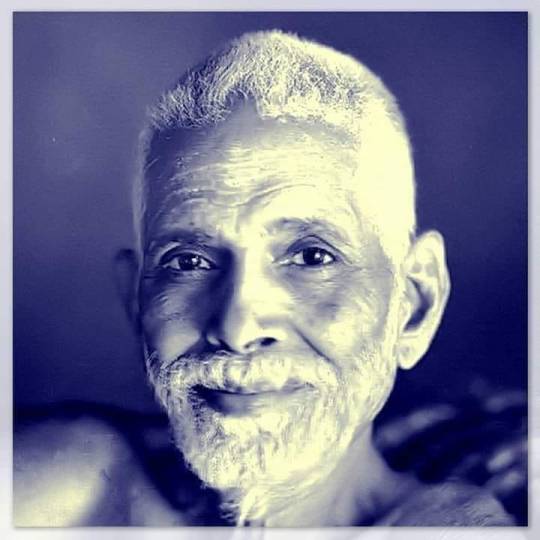
He who removes the darkness from within and without, having obtained that eternal state made of light, who uproots the ignorance of his devotees, who though seeing and sporting in this universe is beyond the universe, to him, Sri Ramana, the Guru of the world and destroyer of sorrow, salutations! ~ Kavyakantha Ganapati Muni - Forty Verses in Praise of Sri Ramana, V. 22
ॐ
What is the Hridaya (Heart or Centre)?
On the 9th of August 1917, Sri Ramana Maharshi sat up at night in the Skandasramam. Kavyakantha and other bhaktas had gathered at his feet. For the benefit of all, Kavyakantha requested the Maharshi to explain fully 'the Heart' ( हृदय ) mentioned in his poem composed in 1915. [See "The Swami’s Verse”].
Maharshi thus answered:
हृदय, i.e. the Heart (or Centre), is that from which all thoughts spring.
A description of it is given in various passages of the Vedas:

The above comparison of the Heart to the plantain bud or lotus bud and various other physical descriptions [The Upanishad compares it also to the leaf of the Aswatha tree (ficus religiosa)] are given to assist the yogi's practice of meditation.
How do we proceed to trace all thoughts to their source, you may ask. Well, let us discover if all thoughts could in the first place be traced to some one thought as their base of operations, and let us then go deeper and find the source of the basic thought. Is there then any such basic or fundamental thought underlying all other thoughts? Do you not see that the thought or idea 'I' – the idea of personality – is such a root thought?
For us, Maharshi explained later, whenever any thought arises, these questions arise and should be raised by the aspirant aiming at Realisation:
'Does this thought exist independently of any person thinking, or does it exist only as the thought of a person, and if the latter is the case, to whom does it arise?'
The answer is: 'This thought arises only as a person's thought and this thought arises in me.' So the 'I' idea may be regarded as a stem from which other thoughts branch forth.
Next let us see the root source of this (stem). But how?
Dive deep in ecstatic concentration within yourself (i.e. within the 'I' thought) and perceive its source. There is nothing there to perceive in or through the senses. You have no guidance from sensation and rationalization for this search.
But if you have the right intuition, the Centre ‘ हृदय ‘ is immediately felt and the above or former 'I' which inquired disappears into this 'the Centre'. Thus, ‘ हृदय ‘ or the Heart Centre is the source of the 'I’-thought and of everything else.
The term ‘ हृदय ‘ (Heart) is however persistently identified by some who practice yoga with one of their six centres चक्रम् (chakram), i.e., their fourth centre called the (anahata chakram) situated in the chest. These yogis admit that ‘ हृदय ‘ denotes the source or abiding place of the personality. Well then, if these yogis wish to trace or promote the development of their personality or soul from its source or abiding place to its highest reach, as they profess to do, they should start its course from (anahata chakram), whereas they invariably start their course from (muladharam) which they style their first chakra. Hence one is perhaps well advised to confine the term, i.e., 'the Centre', to the Universal Centre or Brahman.
Brahman is often indicated in scripture as अयं' हृत् (ayam hrit), two words which make up ‘ हृदय ‘ (hridayam) when conjoined. Even the practicing yogi does not identify the ‘ हृदय ‘ (Heart) or (anahata) with the organ forming the centre of blood circulation (with its auricles and ventricles), and in the above stanza (vide Ch. II) the Heart ‘ हृदय ‘ is not used in a physiological sense, but rather as a metaphor and refers to the centre of consciousness. There is no harm, however, in taking ‘ हृदय ‘ to indicate an actual spatial region as is done in various parts of the scripture. There, ‘ हृदय ‘ is said to be on the right side of the chest (not on the left where the blood propeller is situated). From it radiates the sushumna nadi (or nerve), up which the current of consciousness or light goes to sahasrara (the thousand petalled – evidently referring to the brain with its numberless cells). From that sahasrara the light of consciousness passes again (evidently through the nerves) to all parts of the body and thereby the outside world is experienced by one.
But if the experiencer views the experienced object as something distinct from himself, i.e., from the Self, then he is caught up in the whirl of samsara, the wheel of metempsychosis, or chain of births and deaths. The sahasrara (i.e., brain) of the Atma Nishta, i.e. the Self-realizer, is pure light or enlightenment. If any flitting or passing desires approach it, they perish therein immediately. They have no soil to flourish upon there. The sankalpas or seeds of desire that occur in the Atma Nishta, staying in pure light or suddha sattva, are referred to in the Upanishads as getting parched or fried. Such a भृष्टबीजं (brishtabijam) does not give birth to fresh vasanas (tendencies) or karma (action), as they consume themselves, "nor leave a wrack behind”. This expression is frequently found in other Upanishads, in Vasishta and the works of Sri Sankaracharya, but this reference will suffice.
With the pure light mentioned, outside objects (vishayaha) are sensed or experienced, and their impress received. But, if these impressions are colored or swallowed up in the prevailing non-differentiation of the perfected yogi (Self-realized one), his yoga or Self-realization is not marred thereby. Even when receiving outside impressions, the yogi maintains his consciousness of the unity of existence; and it is this state of central conscious-unity with a (so to speak) peripheral experience of objects (the central light swallowing up the peripheral rays), that is called Sahaja Sthiti. But when the yogi completely shuts out cognizance of outside objects, his state is described as Nirvikalpa Samadhi, i.e., pure concentration, or the Absolute Consciousness without attributes or characteristics.
What are these objects which constitute the external universe? The entire universe or macrocosm is found in man, the microcosm. The entire man is found in the Heart, or Ultimate Centre. Ergo, the entire universe is found within that Centre, the Heart ‘ हृदय ‘. Again, looked at in another way, the external world does not exist without the mind perceiving it. That is, unless a mind perceives and notes the existence of the worlds, how is that existence to be posited? And the mind does not exist without the Centre ‘ हृदय ‘. Ergo, the entire world of experience ends at the Centre.
The respective positions of the Heart (the Centre) and the mind may be illustrated by an analogy:
What the sun is to the solar system – the origin of all, the supporter of all, and that which lights up all – that, the Centre (i.e., the Heart, or that which has intuition), is to man. What the moon is in the external universe, casting a delectable but uncertain light, incapable of creating or sustaining real life or throwing clear light on all objects, that the mind is when it works in or with the brain (sahasrara). Just as the moon borrows its light from the sun, so does the mind derive its power of knowing from the Centre, or Heart. It is when man has no intuition or illumination from that Centre or Heart, that he sees the mind as the only basis of his conscious activity, just as one may have, at night (i.e., when there is no sun), to be content to work by moonlight. At such a time the man is ignorant (pamara), as he does not see the source of all light (i.e., consciousness), viz. the Real, the Atman, but sees objects with the help of the mind alone, and sees them as different from himself; hence, he wanders as in a maze. The Jnani, on the other hand, stationed in the Centre, sees within it the mind, no doubt; but that mind is of as little significance to him as the moon when seen in daylight. The term Prajna has for its superficial denotation (Vachyartha) the mind, but it is in reality, i.e. in its essential content (lakshyartha), the Centre (हृदय), the Heart. Brahman is naught but that. To those who perceive with the help of the mind only, the difference of seer and seen exists, but to those at the Centre, they are one and the same.
Now, as for the advice given in the second half of the stanza (i.e., Chapter II) that one should enter into the Self in the Heart, there are, apart from spiritual enlightenment, other instances of the mind disappearing into the Centre by reason of deep sleep, excessive emotions of joy, sorrow, terror, rage, catalepsy, possession or coma. These also strike the mind and drive it into its source. However, in these states, there is no illumination or even awareness of one's individuality, whereas in the condition of Samadhi, the Self-realization achieved by the yogi, one has such awareness and illumination. That is the difference between Samadhi and the above mentioned states.
~ The Sri Ramana Gita - Chapter V
https://archive.arunachala.org/newsletters/2010/jan-feb

ૐ Arunachala Shiva
#Bhagavan Sri Ramana Maharshi#Sri Ramana Gita#B. V. Narasimha Swami#Kavyakantha Ganapati Sastri#Brahman#Hridaya Heart Centre#hridaya kuhara madhye#mind is thought-'I'#the “I-thought” is the first#root thought#vichara#atma-vichara#Who am I?#Self-enquiry#Self-Investigation#sphurana 'I-I'#intuition
12 notes
·
View notes
Note
(Chantry Asker) I don't defend the Chantry because I think is "has to be good", but part of what Dragon Age encourages us to do is consider the difficulty faced by well-intentioned factions. The Inquisition, for example, has problems, becoming vulnerable to infiltration, and depending on how you played the game, may have done worse. It's not easy to help people, but the Chantry TRIES. Many Thedosian groups don't even do that. If not the Chantry, then to whom do the downtrodden and hopeless turn?
But Anonymous person: this is exactly what I mean. Whence comes this desire to treat the Chantry like some kind of beleaguered, underfunded kindergarten teacher?
“She’s trying, okay? She’s trying.”
Do you feel the need to defend Mass Effect’s Cerberus, too? Sometimes an evil organisation is just an evil organisation.
Why on earth do you think the Chantry is ‘trying’? Again: absolutely no one is saying that a particular revered mother (or Chantry brother or sister) may not be a good person who attempts to help people. That’s not in question. But ‘the Chantry’ is a continent-wide political organisation with massive resources and influence. It is led by a divine and by grand clerics, and on the other side by lord and lady Seekers and by knight-commanders of the templars. It has shaped the world. That’s the scale we are working on here.
No one group in history has impacted life in Thedas more than the Chantry. The influence of this church of the Maker prevails across most of the continent’s kingdoms, and the bulk of humanity pays at least lip service to its tenets. Belief in the Maker has started wars and forced those outside the Chantry to the fringes of society.
– The World of Thedas Volume I
So that’s a good start.
"The Keepers, Shaperate, Qun, Augers, Seers, and Shamen don't help. Only the Chantry.”
That’s one of the first things you said to me. And it’s so confusing because ... it reads like you really don’t grasp that these people are not in Lothering because, largely, they have been driven to the margins by Orlais and its Chantry. They can’t be there. They would die.
Just as an example – can you imagine what would happen to an augur who set up in some Chantry-dominated village? Started summoning his gods, offering guidance and assistance, suggesting spirit possession to help training young mages? The poor bastard wouldn’t live out the day. But that wouldn’t be his fault. His people aren’t the ones practising religious persecution.
How – how – does that demonstrate the virtue of the Chantry? You can’t give someone points for being the only game in town when they’ve killed all the other players.
The Chantry began and has continued to be a predominantly human organisation. Other races are seen to be further from the Maker. The elves have their false pantheon of idols. The dwarves worship themselves. The Qunari are the worst of all, actively crushing worship of the Maker and desecrating Chantry values in the name of the Qun.
– The World of Thedas Volume I
They have built the racism right into their doctrine, so that’s nice. And the religious persecution. And just ... zero self-awareness in that they hate the Qunari for converting by force when they do the same thing.
But let’s think about your "downtrodden and hopeless”, shall we?
Why is it that most of the elves in Thedas live in abject poverty, and regardless of their skills are effectively barred from bettering their lot? Oh, that’s right. Because the Chantry invaded their homeland, stole it from them, and forced them to live in slums and convert to the Chantry faith.
But you already know that something went wrong. A small elven raiding party attacked the nearby human village of Red Crossing, an act of anger that prompted the Chantry to retaliate and, with their superior numbers, conquer the Dales.
We were not enslaved as we had been before, but our worship of the ancient gods was now forbidden. We were allowed to live among the humans only as second-class citizens who worshipped their Maker, forgetting once more the scraps of lore we had maintained through the centuries.
– The City Elves
Why is it that most mages are dependant on Chantry run Circles to house, feed and clothe them? Oh, that’s right. Because the Chantry kidnaps them as children, prevents them from inheriting their family titles and property, and steals their children in turn should they have any.
Chantry law requires those with significant magical ability to join the nearest Circle and live under its supervision. While Thedosians with extremely low levels of magical talent are generally permitted to go about their lives, they are still closely watched. In most nations, practising magic and not joining a Circle is to be branded an apostate and, thus, a danger to society. Those who survive capture are turned over to the Circle to become students or prisoners, depending on the circumstances.
– The World of Thedas Volume I
So that’s ... pretty great. It sounds as though you’re suggesting – best case scenario – that the Chantry should get points for setting up a soup kitchen for the homeless, when they were the ones who burned down those people’s houses. And built an ugly mansion on the land.
But that really is a ... best case scenario. It doesn’t really fit with the reality of how the Chantry operates. I mean: the Chantry takeover in Kirkwall was a fucking disaster. Meredith had death squads. I mean – death squads. That whole situation was a dystopian nightmare.
And then there’s whatever the fuck is going on in Tantervale:
Chantry law is all but absolute in Tantervale, earning the city its dour reputation. The city guard is obsessed with enforcement. A street urchin would get a year in the dungeon for something that would get him a pat on the back in Orlais.
– World of Thedas Volume I
So ... yay for theocracy? And then there’s the clusterfuck in Jader:
The overpopulation and poor living conditions led to an outbreak of disease that nearly crippled the city, followed by famine in the poorer sections when it was quarantined.
Mother Giselle, whose prosperous chantry was in a wealthier quarter, wrote to Val Royeaux asking for assistance from the Chantry. When help was not immediately forthcoming, it is said that she addressed the clerics of her chantry. “As Andraste herself said, ‘My faith sustains me; I shall not fear the legion,’ then so shall faith sustain the hungry in this time of need,” Giselle told them. “As we have devoted our lives to divine contemplation, such a diet should come to us quite easily.” With that she took the unprecedented step of taking all of her chantry’s food into the poor quarters of Jader, distributing it to peasants who would otherwise have starved to death.
Shocked and shamed by what some in Val Royeaux privately referred to as an ostentatious bullying tactic, Chantry officials coordinated relief efforts. Food arrived quickly, along with instructions on how it was to be distributed: first to the Jader chantry to end the hunger strike, then to the Orlesian peasants, then to the Fereldan refugees, and finally to the elves of the alienages. Mother Giselle famously replied to the orders by saying, “If we believe that some have fallen further from the Maker’s grace than others, then those who have fallen further are in greatest need of our care. We cannot fill their souls until we have filled their bellies.” With the support of Lady Seryl of Jader, who was directing relief efforts of her own, Giselle ignored the directives and fed the poor of the city without regard for race or nationality.
Her actions saved thousands of lives in Jader and made her a beloved figure among the poor in Orlais and Ferelden alike. Those actions also destroyed her chances of any official political advancement in the Chantry, as the grand clerics did not look kindly on being shown up in such a manner.
– World of Thedas Volume II
So, five important points here:
1) Mother Giselle’s actions are ‘unprecedented’. So stepping up like that and forcing the Chantry to give aid in a time of crisis is not actually standard practice.
2) This is a clear example of a person attempting to do good and being stymied by the Chantry hierarchy.
3) The Chantry is, in case anyone forgot, really fucking racist.
4) Ending a famine also ended this woman’s political career, because the Chantry just cannot stop being The Worst.
5) While Giselle is undeniably doing some really awesome stuff here, that bit about not being able to fill people’s souls before filling their bellies indicates that even good people tend to do harm when following Chantry doctrine, because they can’t just ‘do good’. They’re also pushing conversion.
Whenever and wherever the Chantry has real power, they tend to do terrible harm. They do it on such a scale, on such a level of ‘these bloody hands may never be clean again’ awful that ... a few acts of kindness can’t easily redeem them.
To be critical of the Chantry, I don’t need to have another option. I can critique a thing without going further – especially since ‘The Chantry killed everyone else’ is ... pretty much why other people aren’t around to help. But ... it really isn’t as if no one else knows how to do good?
I mean – look at Alistair. Assuming you made him king, he shows up with ships to bring the Fereldan refugees home, and offers aid to rebel mages. He fights with Meredith about it. That aid continues into Inquisition. While the Chantry is busy tearing Kirkwall apart, Alistair is helping. Anders runs a clinic for the poor and dispossessed in the Kirkwall sewers. He’s so damn popular that a mob turns up to defend him. That’s just one man. Most people like him are locked up, so they can’t help. Imagine a thousand clinics run by spirit healers.
Or ... did ... no one listen to Merrill?
Merrill: What does your Chantry do? I mean, you keep saying how great it is. Anders and Isabela tell me to stay away from it. But what does it do? Among the Dalish, the Keepers teach the children, preserve our history, perform magic. The priestesses here just... sing.
Sebastian: The Chantry does many charitable works. It cares for widows and orphans –
Merrill: Who in the Dalish would just be part of the clan, like everyone else. I just don't get it.
...
Bethany: So, there's no Circle among the Dalish?
Merrill: Any child with the gift of magic is apprenticed to a Keeper... in another clan if there's no need in her own.
Bethany: That sounds nice.
Merrill: Magic is a gift of the Creators. Why wouldn't we use it? It just seems... wasteful for humans to lock their mages away where they can't do any good.
– Merrill Dialogue
The Dalish would regard ‘charity’ as a communal duty, and magic as a tool to help people. She’s not wildly impressed by the Chantry, which is not doing enough good of any kind for her to notice. Merrill lives in one of the poorest parts of the city. So. Maybe her way might be worth a try?
Individuals can do good. Organisations can do good. These things are not in question. But the Chantry is – and I say this again – an imperial religion. Its primary function is to serve the Orlesian empire, which is racist, power hungry and deeply religiously intolerant. Empires are bad news.
I’ve seen the examples you’ve given. They exist. Some of them are real instances of a Chantry official, or a small, local chantry, doing a Good Thing. But I have to ask ...
Can you really look at a set of scales that has ‘genocide’ on one side and ‘helped out a single mum that one time’ on the other and say “Sure, that balances”?
154 notes
·
View notes
Text
The literary sources of BTS’ “Singularity” (Part II)
Chapter II: Oedipus Rex, the blind who had eyes
* This is a personal and purely philological analysis, that is, centred on the study of literature and/or the language as used in literature.
* This post was originally written in Spanish and translated into English, sorry if there are any errors.
* You can check part I --Narcissus and the problem of self-identity--, here.
* Also, you can check my in-depth analysis of Singularity lyrics here.
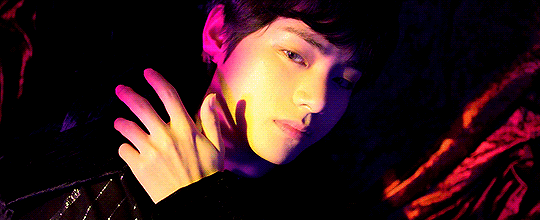
As we established in the first part of the analysis, one of the main literary sources of "Singularity" is the classic myth of Narcissus, established in Western culture through the Metamorphosis by Ovid. Remember that Narcissus, the son of a nymph and a god, ends up so enamoured with his reflection that he ends up falling into the water where his beautiful face appears, dying because of his own vanity. We affirmed that in one of the versions of the myth, the mother of Narcissus, the nymph Liriope, decides to visit Tiresias (in ancient Greek, Τειρεσίας), one of the most famous soothsayers of Greek mythology. This character, present as a prophet in all Greek tragedies related to the founding of the city of Thebes --one of the most important social nuclei of ancient Greece-- is not only considered the mediator between gods and humans but between men and women --by its androgynous nature. and between life and death.
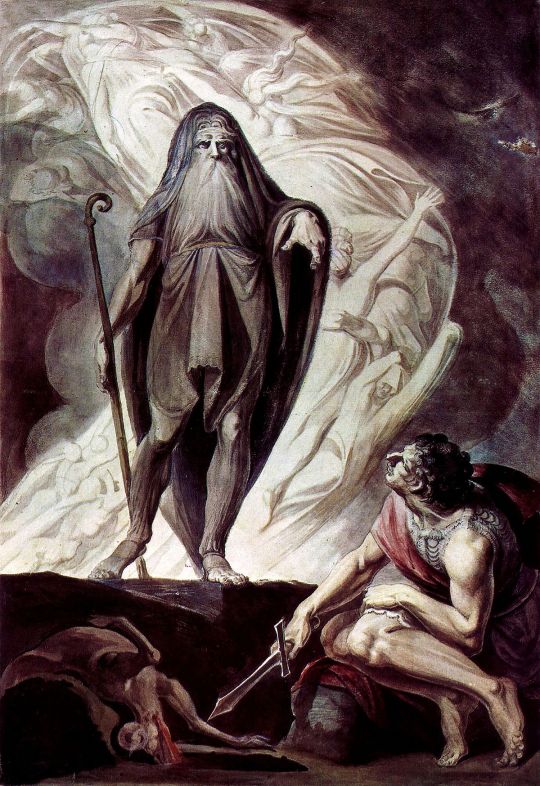
[Tiresias appears in front of Odysseus during the sacrifice, Heinrich Füssli (1780-85)]
One of the main tragedies, and the one that will centre this second part, is Oedipus Rex (Oι̉δίπoυς τύραννoς), a Greek tragedy written by Sophocles in an unknown date (it is believed that it was composed around 430 BC). Broadly speaking, the work begins during the mandate of Oedipus, king of Thebes and husband of Jocasta. His glorious reign is dying by an aggressive epidemic of plague and he orders his brother-in-law Creon to depart for the Oracle of Delphi (a sacred temple dedicated to Apollo, built in the Villa of Delphi, Greece).
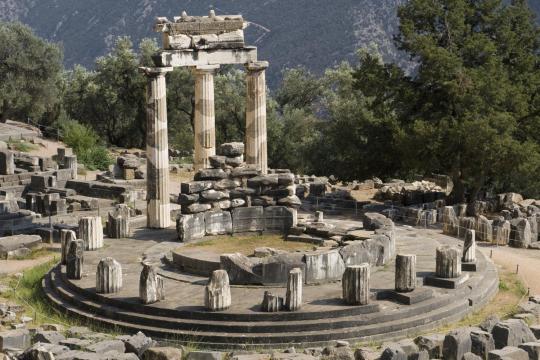
The prediction is clear: the plague is a divine punishment because the death of Laius, the previous king, has not been avenged and it will not disappear until the guilty party is killed or sent into exile. After this, Oedipus collaborates arduously to discover the culprit -- to who promises to save his life and only punish him/her with exile--, relying on his citizens and the close members of his family. It is precisely Creon who introduces the character of Tiresias since he advises the monarch to come to him to solve the problem.
OEDIPUS: Teiresias, you who understand all things—what can be taught and what cannot be spoken of, what goes on in heaven and here on the earth—you know, although you cannot see, how sick our state is. And so we find in you alone, great seer, our shield and saviour.
We must bear in mind that Tiresias, who appears in this work as a character already known from other mythological cycles --Greek tragedies were represented in the amphitheatres and used to use dynasties of characters that all the public knew-- is a blind fortune-teller. When he arrives in Thebes, he refuses to declare what he knows, even though he was present at the time of Laius' murder, and he and Oedipus confront each other in a heated conversation. Irritated, Tiresias declares that Oedipus is the murderer that Oedipus himself is searching for and insinuates him that he lives in incest with his mother, with whom he has had children, he is not the Theban as he believes and that, shortly, he will be blind like him. Faced with such accusations, Oedipus does not believe him and thinks that the fortune-teller has conspired with Creon to snatch his throne.
TEIRESIAS: I say that with your dearest family, unknown to you, you are living in disgrace. You have no idea how bad things are.
OEDIPUS: Do you really think you can just speak out, say things like this, and still remain unpunished?
TEIRESIAS: Yes, I can, if the truth has any strength.
OEDIPUS: It does, but not for you. Truth is not in you— for your ears, your mind, your eyes are blind!
TEIRESIAS: You are a wretched fool to use harsh words which all men soon enough will use to curse you.
TEIRESIAS: You may be king, but I have the right to answer you—and I control that right, for I am not your slave. I serve Apollo, and thus will never stand with Creon, signed up as his man. So I say this to you, since you have chosen to insult my blindness— you have your eyesight, and you do not see.
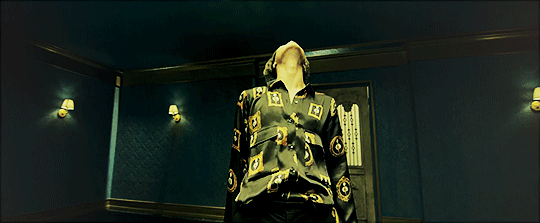
Since the tragedy is extensive, I will try to explain the argument briefly. Finally, Oedipus, who was actually the heir of the kings of Corinth, left his city because of an oracle that proclaimed that he would kill his father and marry his mother. He wanted to avoid the tragedy of his destiny and fled. During the way, he's entangled in a brawl in which he assassinates several people ..., one of them turns out to be Laius. With the intervention of several witnesses, it is known that Oedipus was not the biological son of the kings of Corinth since he had been abandoned on a mountain shortly after being born and saved by a messenger from the kingdom of Corinth. Little by little, Jocasta, his wife, realizes the truth: Oedipus is the son that she and Laius abandoned to their fate so that a fateful oracle would not be fulfilled, unaware that the messenger had managed to save him. Oedipus, oblivious to his true identity, had become a brave citizen of Thebes and, after overcoming the enigma of the Sphinx, took the throne. Married to his mother and having killed his real father, Oedipus stabs his eyes, not wanting to see the tragedy of his existence, and asks for an exile with his two daughters, which marks the end of the story.
OEDIPUS: But the hand which stabbed out my eyes was mine alone. In my wretched life, why should I have eyes when nothing I could see would bring me joy?
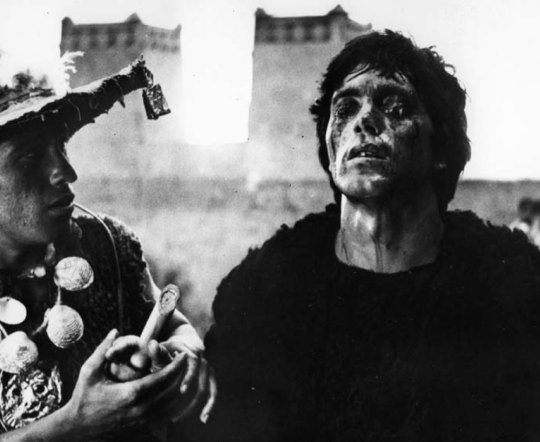
[Oedipus Rex, film adaptation by Pier Paolo Passolini (1967)]
In summary, we can see that Tiresias is the only one, by being ironically blind, who can see the truth in a world full of people who have eyes but cannot see. He's the famous prophet whose true revelation is not accepted when he twice proclaims it. The originality of Sophocles lies in this irony (especially taking into account that Tiresias appears at the beginning of the tragedy), in the belief that the knowledge of the human being is not a simple objective fact that is imposed on us, but a subjective possession before the one we can react belligerently, as a possession that partly needs to be possessed by the one who receives it to become effective. That is why Oedipus rebels against the truth, because he believes more in him than in the gods.

A fatal love, the intervention of a vengeful divinity or the problematization of sight are common themes between the myth of Narcissus, Oedipus Rex and Singularity. If we stop a bit in the lyrics, we can extract some examples:
A sound of something breaking I awake from sleep
We have the fracture, the rupture of the individual once he realizes he's wearing a mask, he's blind.

I dumped myself into the lake I buried my voice for you Over the winter lake I was thrown
The lake, an obvious reference to Narcissus and his death. On the other hand, the second verse talks about a certain culprit (that’s why he says 'for you’ or uses passive verbs that exempt him from responsibility: 'I was thrown’), like if he was even talking to a god, maybe to a woman (that's the simplest interpretation). However, he's talking to himself. He's the culprit of his blindness like Oedipus is.
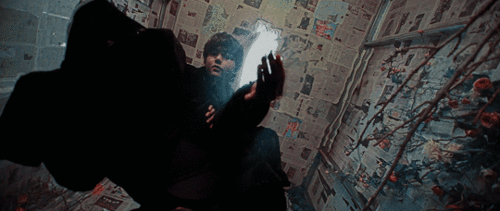
In addition, another interesting aspect is the last speech of the tragedy. This is said by the chorus, a collective character who comments and judges what happens in the tragedy and represents the Theban citizen, the public. I could not help thinking about the dancers of the video.

CHORUS: You residents of Thebes, our native land, look on this man, this Oedipus, the one who understood that celebrated riddle. He was the most powerful of men. All citizens who witnessed this man’s wealth were envious. Now what a surging tide of terrible disaster sweeps around him. So while we wait to see that final day, we cannot call a mortal being happy before he’s passed beyond life free from pain.
Also, BTS tends to distort the figure of the idol, that is, the famous singer who is seen as a deity and not as a human being. Oedipus, like Taehyung, is seen by the public as a king, as a divine emissary, but eventually ends up being as mundane as the spectators. He suffers, he has doubts and, sometimes, he doesn't love himself either.

Lastly (I KNOW THAT I AM WRITING A LOT), among the main themes of this fabulous work of universal literature, we must talk about the problem of the search for truth and the risks and harms involved in achieving knowledge. Nietzsche speaks of this drama in the 9th chapter of the Birth of Tragedy (1871-1872). The main thesis of this book states that art is based on two fundamental notions that the Greeks of the archaic era and the classical era, ie, the Greeks prior to Socrates, knew: the two fundamental impulses of nature that are symbolized by two Greek gods, Dionysus and Apollo.
Apollo and Dionysus symbolize two physiological states of the human being: sleepiness and drunkenness; as well as two vital impulses: the individuation (JUNG'S INDIVIDUATION PROCESS!!!!!) and the overflow. Broadly speaking, Nietzsche makes use of the deities to highlight the human condition in its strictest sense and, in turn, unveil the struggle or opposition of forces that hide in the bosom of nature. Apollo symbolizes the veil (the beautiful forms/artistic creations that adorn life and justify it) and Dionysus symbolizes suffering, death, truth..., the tragic wisdom, that is, the terrible awareness of the finitude of Men and his suffering existence. Nietzsche states that the hypertrophy of some of the elements could be harmful to man, an excess of veil could lead to optimism and rationalism, and an excess of truth could lead to suicide or asceticism. Both elements are necessary so that life can be kept in balance.
To end, Nietzsche presents Oedipus as a transgressor, a hero condemned to fall for having tried to go too far. By transgressing nature and social norms, and wanting to find out what is forbidden, Oedipus discovers a world whose vision is forbidden to the rest of mortals. He commits a masculine, heroic version of original sin by choosing to eat from the tree of knowledge that condemns humanity to abandon innocence. In this case, it is his curiosity and his integrity that encourages him to investigate. That abandonment of innocence, of comfortable ignorance, is the cruel and heroic destiny of Oedipus, and his deed consists in his sacrifice (LIKE IT HAPPENS IN 'DEMIAN'!!!). Searching in ourselves, inquiring into our motives and wounds, has a price, it leads to a rupture of the individual necessary for the rebirth of the being.
Thus the man who is responsive to artistic stimuli reacts to the reality of dreams as does the philosopher to the reality of existence; he observes closely, and he enjoys his observation: for it is out of these images that he interprets life, out of these processes that he trains himself for life. It is not only pleasant and agreeable images that he experiences with such universal understanding: the serious, the gloomy, the sad and the profound, the sudden restraints, the mockeries of chance, fearful expectations, in short the whole 'divine comedy' of life, the Inferno included, passes before him, not only as a shadow-play — for he too lives and suffers through these scenes — and yet also not without that fleeting sense of illusion; and perhaps many, like myself, can remember calling out to themselves in encouragement, amid the perils and terrors of the dream, and with success: 'It is a dream! I want to dream on!' Just as I have often been told of people who have been able to continue one and the same dream over three and more successive nights: facts which clearly show that our innermost being, our common foundation, experiences dreams with profound pleasure and joyful necessity (Nietzsche, The Birth of the Tragedy).
I hope you liked this and found it interesting and easy to read. I’m working in the next chapters, which will talk, among many things, about these works/characters/topics:
Frankenstein (Mary Shelley, 1818): A man can create his own monster
Wuthering Heights (Emily Brönte, 1847): Narcissus and Heathcliff
Jane Eyre (Charlotte Brönte, 1847): Understanding the Double - Jane Eyre and Bertha Mason
Alice Through the Looking-Glass (Lewis Carroll, 1871): The mirror symbolism
Strange Case of Dr. Jekyll and Mr. Hyde (Robert Louis Stevenson, 1886): Evil in a reflected identity
The Picture of Dorian Gray (Oscar Wilde, 1890): Self-image and ego
Dracula (Bram Stocker, 1897): Innate evil without a reflection
Peter Pan (James Matthew Barrie, 1904): Seeking for a reflection in the absence of shadows
Ophelia (from Hamlet, by William Shakespeare, 1603): Madness, water and suicide
From the myth to contemporaneity: how to codify identity and body in the information age
#365booksfornamjoon#rmbooks#rm books#namjoon reading#namjoon books#namjoon reading list#kim daily#bts theory#bts analysis#bts lyrics#singularity#singularity explained#bts singularity#oedipus rex#sophocles
36 notes
·
View notes